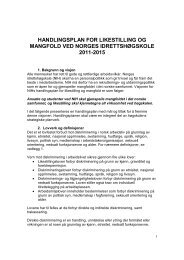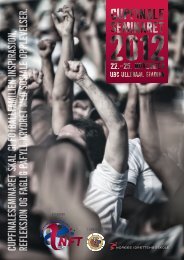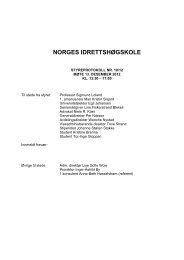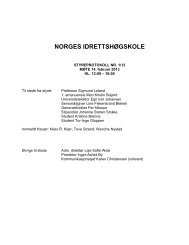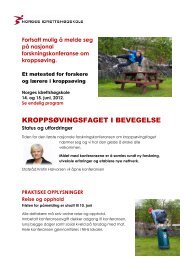Biomechanics and Medicine in Swimming XI
Biomechanics and Medicine in Swimming XI
Biomechanics and Medicine in Swimming XI
You also want an ePaper? Increase the reach of your titles
YUMPU automatically turns print PDFs into web optimized ePapers that Google loves.
<strong>Biomechanics</strong><strong>and</strong>medic<strong>in</strong>e<strong>in</strong>swimm<strong>in</strong>gXi<br />
A Conceptual Paper on the Benefits of a Non-<br />
Governmental Search <strong>and</strong> Rescue Organization<br />
Wengel<strong>in</strong>, M. 1 , de Wet, t. 2<br />
1Lund University, Department of Service Management, Hels<strong>in</strong>gborg, Sweden<br />
2National Lake Rescue Institute, Kampala, Ug<strong>and</strong>a<br />
This conceptual paper aims at discuss<strong>in</strong>g the characteristics of <strong>and</strong> differences<br />
between modern Western <strong>in</strong>dependent SAR <strong>in</strong>stitutions <strong>and</strong><br />
the <strong>in</strong>itiatives that have been taken <strong>in</strong> develop<strong>in</strong>g countries. It highlights<br />
the benefits of the non-governmental SAR organization, not only to<br />
provide search <strong>and</strong> rescue capacity, but also to be a vehicle of progress<br />
<strong>and</strong> change.<br />
Key words: search <strong>and</strong> rescue, safety at sea, poverty reduction<br />
IntroductIon<br />
Maritime Search <strong>and</strong> Rescue (SAR) is a state responsibility covered <strong>in</strong><br />
<strong>in</strong>ternational regulations such as the United Nations Convention on<br />
Law of the Sea (UNCLOS), the Safety of Life at Sea Convention (SO-<br />
LAS) <strong>and</strong> the 1979 SAR Convention. UNCLOS for example, says that<br />
every State must require the master of a ship fly<strong>in</strong>g its flag to render<br />
assistance to any person found at sea <strong>in</strong> danger of be<strong>in</strong>g lost <strong>and</strong> to proceed<br />
to the rescue of persons <strong>in</strong> distress. Furthermore, it requires every<br />
coastal State to promote the establishment, operation <strong>and</strong> ma<strong>in</strong>tenance<br />
of an adequate <strong>and</strong> effective search <strong>and</strong> rescue service regard<strong>in</strong>g safety<br />
on <strong>and</strong> over the sea <strong>and</strong>, where circumstances require, by way of mutual<br />
regional arrangements, to co-operate with neighbour<strong>in</strong>g States for this<br />
purpose. In this way, UNCLOS provides the legal framework for action.<br />
However, the details of search <strong>and</strong> rescue obligations are to be found<br />
<strong>in</strong> various International Maritime Organization (IMO) Conventions.<br />
The Search <strong>and</strong> Rescue (SAR) Convention of 1979 gives a clear<br />
def<strong>in</strong>ition of the term “rescue”. It <strong>in</strong>volves not only “an operation to retrieve<br />
persons <strong>in</strong> distress, provide for their <strong>in</strong>itial medical or other needs” but<br />
also to “deliver them to a place of safety”. This obligation to <strong>in</strong>itiate action<br />
is activated once the responsible authorities of a State Party receive <strong>in</strong>formation<br />
that any person is, or appears to be, <strong>in</strong> distress at sea. It further<br />
states that, once a State Party has accepted responsibility to provide<br />
search <strong>and</strong> rescue services for a specified area, it is obliged to use search<br />
<strong>and</strong> rescue units <strong>and</strong> other available facilities for provid<strong>in</strong>g assistance<br />
to anyone <strong>in</strong> distress at sea, <strong>and</strong> that such assistance is to be provided<br />
“regardless of the nationality or status of such a person or the circumstances <strong>in</strong><br />
which that person is found”.<br />
The Safety of Life at Sea Convention (SOLAS) spells out the obligation<br />
on ships’ masters to render assistance. It says:<br />
384<br />
“The master of a ship at sea which is <strong>in</strong> a position to be able to<br />
provide assistance, on receiv<strong>in</strong>g a signal from any source that<br />
persons are <strong>in</strong> distress at sea is bound to proceed with all speed<br />
to their assistance, if possible <strong>in</strong>form<strong>in</strong>g them or the search <strong>and</strong><br />
rescue service that the ship is do<strong>in</strong>g so.”<br />
Elsewhere, it stipulates that contract<strong>in</strong>g Governments should undertake<br />
measures “to ensure that necessary arrangements are made for the rescue of<br />
persons <strong>in</strong> distress at sea around its coasts.”<br />
In most of the developed world, with a high level of commercial traffic<br />
<strong>and</strong> leisure boat<strong>in</strong>g, this responsibility is h<strong>and</strong>led by a comb<strong>in</strong>ation of<br />
governmental organizations (Coast Guard, Naval units, Mar<strong>in</strong>e Police,<br />
Pilots etc) <strong>and</strong> non-governmental SAR specialists like the Royal National<br />
Lifeboat Institute (RNLI) of the Netherl<strong>and</strong>s, The German Sea<br />
Rescue Society (DGzRS) <strong>and</strong> the Swedish Sea Rescue Society (SSRS).<br />
In the develop<strong>in</strong>g world this is not usually the case. The SAR is <strong>in</strong> many<br />
cases covered by a small <strong>and</strong> not always operative navy <strong>in</strong> comb<strong>in</strong>ation<br />
with Coast Guard <strong>in</strong> areas with commercial traffic or areas with national<br />
strategic importance. In areas with a high density of tourism there might<br />
be found occasional SAR units specialized <strong>in</strong> tak<strong>in</strong>g care of tourism<br />
related accidents like scuba div<strong>in</strong>g cases (Egypt, Red Sea) with a focus<br />
on medical evacuation. With the ma<strong>in</strong> part of the commercial traffic <strong>and</strong><br />
tourism areas basically taken care of, there is one large group of seafarers<br />
left. Who is look<strong>in</strong>g out for the <strong>in</strong>dividual, local, artisanal small-scale<br />
fisherman <strong>in</strong> the small boat, outrigger or canoe?<br />
“In some countries little consideration is given to SAR services for<br />
small scale or artisanal fishermen due to <strong>in</strong>sufficient awareness,<br />
lack of resources, lack of personnel knowledgeable about mar<strong>in</strong>e<br />
safety problems, lack of suitable craft, geographical considerations<br />
(e.g. numerous remote isl<strong>and</strong>s), <strong>in</strong>adequate technical l<strong>and</strong> <strong>in</strong>stitutional<br />
<strong>in</strong>frastructure <strong>and</strong> other reasons. Because many fishermen<br />
are not politically powerful, <strong>and</strong> because there are no compell<strong>in</strong>g<br />
statistics on losses, this issue is often overlooked though,<br />
more recently, fishermen have become more active <strong>in</strong> push<strong>in</strong>g such<br />
services or organiz<strong>in</strong>g them on their own.” The International Labor<br />
Organization (ILO 1999)<br />
Compet<strong>in</strong>g with urgent issues such as combat<strong>in</strong>g diseases like AIDS<br />
<strong>and</strong> malaria, environmental problems, <strong>in</strong>sufficient <strong>in</strong>frastructure <strong>and</strong><br />
<strong>in</strong>vestments <strong>in</strong> the military due to <strong>in</strong>ternal or regional <strong>in</strong>stability, the<br />
<strong>in</strong>vestments <strong>in</strong> a functional SAR network that reaches the outback fish<strong>in</strong>g<br />
village is not high on the priority list. It is also not unusual that a<br />
most urgent need for <strong>and</strong> responsibility for SAR is a borderl<strong>in</strong>e problem<br />
somehow situated between different m<strong>in</strong>istries, as is even the case <strong>in</strong> the<br />
<strong>in</strong>ternational arena, a Department of Shipp<strong>in</strong>g (or the IMO) on the one<br />
h<strong>and</strong> <strong>and</strong> a Department of Fish<strong>in</strong>g or Fish<strong>in</strong>g Authority Organization<br />
on the other. It is furthermore common to categorize maritime search<br />
<strong>and</strong> rescue as be<strong>in</strong>g the most expensive method of sav<strong>in</strong>g lives at sea.<br />
This is, however, a very limited view on SAR <strong>and</strong> is usually put forward<br />
by non SAR professionals. SAR as an operation is the last resort; that<br />
is, carry<strong>in</strong>g out search <strong>and</strong> rescue; to f<strong>in</strong>d <strong>and</strong> save a person <strong>in</strong> distress.<br />
Isolated, this can be seen as a costly exercise, <strong>and</strong> if focus<strong>in</strong>g on high<br />
tech operations with helicopters <strong>and</strong> rescue cruisers it is certa<strong>in</strong>ly rather<br />
expensive. But there is another side of the co<strong>in</strong>. A SAR organization<br />
<strong>and</strong> especially non-governmental ones, works actively to avoid SAR<br />
operations through activities like education, <strong>in</strong>formation, tra<strong>in</strong><strong>in</strong>g, <strong>and</strong><br />
awareness campaigns. These are activities acknowledged as important<br />
for safety at sea (ibid), <strong>and</strong> should be an <strong>in</strong>tegrated part of a SAR system.<br />
A governmental SAR organization, where SAR usually is one of<br />
many tasks, can use the power of regulations when such are <strong>in</strong> place. A<br />
non-governmental organization works more closely with the community,<br />
often actively supported by the community where it is based. From<br />
this perspective SAR is more broadly def<strong>in</strong>ed; sav<strong>in</strong>g lives starts with<br />
knowledge <strong>and</strong> tra<strong>in</strong><strong>in</strong>g, <strong>and</strong> the costs of a SAR organization are thus<br />
seen <strong>in</strong> another light. The specialized competence embedded <strong>in</strong> a SAR<br />
organization is beneficial through the entire cha<strong>in</strong> of “sav<strong>in</strong>g lives”, from<br />
promot<strong>in</strong>g life jackets to actually search<strong>in</strong>g <strong>and</strong> rescu<strong>in</strong>g.<br />
The purposes of this paper are thus i) to highlight the role of the<br />
SAR organization (especially non-governmental) with<strong>in</strong> the broader<br />
perspective of life sav<strong>in</strong>g <strong>and</strong> poverty reduction, ii) to describe the function<br />
of the typical non-governmental SAR organization, <strong>and</strong> iii) to describe<br />
the case study of the National Lake Rescue Institute (NLRI, the<br />
non-governmental SAR organization <strong>in</strong> Ug<strong>and</strong>a).<br />
Methods<br />
This paper is based on qualitative evaluation of an exist<strong>in</strong>g system<br />
of SAR organized by the National Lake Rescue Institute of Ug<strong>and</strong>a<br />
(NLRI). It is also an evaluation of the operation of this organization as a<br />
Non-Governmental Organization as compared to SAR organizations <strong>in</strong><br />
developed countries as well as governmental agencies. The material used




